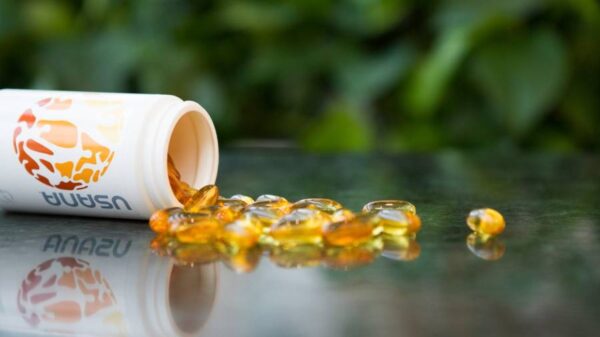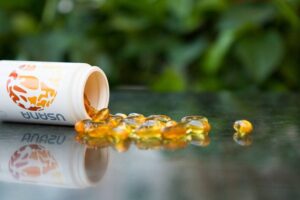Brain Armor is one of the many Omega-3 based supplements available today. Our comprehensive Brain Armor review analyzes all aspects of this brain supplement, starting with the company and finishing with key details such as potential side effects, recommendations, warnings, claimed benefits, and where to buy the supplement at the best price possible.
Let’s start by looking at what exactly is Brain Armor.
Overview
Brain Armor is an Omega-3 brain supplement claimed to optimize mental performance, support neuroplasticity, support a healthy immune system, and promote brain-derived neurotrophic factor (BNDF).
The supplement is available in several variants:
- Classic Formula 56 vegan softgels;
- Classic Formula 120 vegan softgels;
- Pro Brain Nutrient Formula 250 concentrated liquid packs;
- Pro Liquid 50 packs 10 ml each;
- Adult 50+ 8 oz vegan liquid concentrate;
- Gut-Brain Formula 15 single-serving stick packs.
Who Makes It?
Brain Armor is made by Trident Brands Incorporated, a trademark of DSM Corporation. DSM is a Dutch science-based company known for developing a wide range of health and nutrition supplements. Furthermore, DSM powers dozens of brands, ranging from skin creams to health supplements to environmental-friendly electronics.
DSM is a highly regarded brand, especially in Europe, where it is known to invest in brands they believe can offer consumers good products. DSM supporting Trident Brands and Brain Armor is a great sign.
Trident Brands contact details:
- Address: 101-200 S. Executive Dr., Brookfield WI 53005
- Phone: (888) 600-4317
- Email: info@brain-armor.com
- Website: brain-armor.com
Brain Armor Ingredients
Brain Armor contains the following active ingredients per serving (2 softgels):
- Vitamin D (as Cholecalciferol) 20 mcg (800 IU)
- Vitamin E (as d-Alpha Tocopheryl Acetate) 13 mg (20 IU)
- Sodium 15 mg
- Total Omega-3 Fatty Acids (from algal oil) 1,283 mg
- DHA 700 mg
- EPA 350 mg
- MCT (Medium Chain Triglycerides from Coconut Oil) 45 mg
Inactive ingredients include vegan softgel capsules (modified from starch, carrageenan, glycerin, sorbitol, and purified water), high oleic sunflower oil, mixed tocopherols, rosemary extract, and ascorbyl palmitate.
This formulation’s core ingredients are the Omega-3s (DHA and EPA), supported by Vitamin D, Vitamin E, and sodium.
Omega-3 for Depression and Anxiety
Depression is the mental disorder of this century. More than 260 million people of all ages suffer from depression worldwide. Globally, depression is a primary cause of disability and is a significant contributor to the disease’s overall global burden.
Depression is commonly associated with lethargy, sadness, and a general lack of interest in life.
Another common disorder is anxiety, characterized by constant nervousness and worry.
Out of the three types of Omega-3s (DHA, EPA, and ALA), EPA is believed to offer the most benefits when fighting anxiety and depression.
Interestingly, studies suggest that people who consume Omega-3s regularly are less likely to be depressed. Furthermore, when patients with anxiety and depression start taking Omega-3 supplements, their symptoms improve.
Omega-3 Benefits During Pregnancy and Early Life
EPA, DHA, and ALA are all beneficial for brain growth and development in infants. DHA alone accounts for 60% of the polyunsaturated fatty acids in your eye’s retina and 40% in your brain.
Therefore, it’s no surprise that infants fed a DHA-fortified formula have better eyesight than infants fed a formula without it.
Getting enough Omega-3s during pregnancy is linked with several benefits for your child, including:
- Fewer behavioral problems;
- Better social and communication skills;
- Decreased risk of developmental delay;
- Higher intelligence;
- Reduced risk of ADD/ADHD, autism, and cerebral palsy.
Omega-3 May Reduce ADD/ADHD Symptoms in Children
Attention deficit hyperactivity disorder (ADHD) and attention deficit disorder (ADD) are two behavioral disorders distinguished by hyperactivity, inattention, and impulsivity.
Several studies note that children with ADD/ADHD have less Omega-3 fatty acids in their blood than their healthy peers. What’s more, several clinical studies concluded that Omega-3 supplements can help fight ADD/ADHD symptoms.
Omega-3s help decrease impulsiveness, hyperactivity, aggression, and restlessness. They also improve inattention and task completion.
Researchers recently observed that fish oil supplements were among the most promising treatments for ADD/ADHD.
How Much Does Brain Armor Cost?
This supplement price varies based on the variant you want to purchase:
- Classic Formula (56 vegan softgels / 28 servings) – $29.99
- Classic Formula (120 vegan softgels / 60 servings) – $49.99
- Pro Brain Nutrient Formula (250 concentrated liquid packs / 250 servings) – $750.00
- Pro Liquid (50 packs 10 ml each / 50 servings) – $149.99
- Adult 50+ (8 oz vegan liquid concentrate / 24 servings) – $49.99
- Gut-Brain Formula (15 stick packs / 15 servings) – $17.99
Where To Buy Brain Armor?
You shouldn’t have any problems finding Brain Armor online or in local stores. Some important online stores selling Brain Armor include:
- Amazon
- eBay
- The Vitamin Shoppe
- A1 Supplements
- CVS
- Walmart
- Nature’s Source (Canada)
Brain Armor Review – Pros & Cons
Pros
Cons
Brain Armor Side Effects & Warnings
Side effects of Omega-3 supplements are usually mild. Mild upset stomach or flushing may occur. These effects are typically temporary and may disappear as your body adjusts to the product.
Severe allergic reactions to Omega-3 supplements are infrequent. However, seek immediate medical attention if you notice any severe allergic reaction symptoms, including trouble breathing, itching, swelling (especially of the tongue, face, or throat), rash, or severe dizziness.
Claimed Benefits
Brain Armor claimed benefits include:
- Increases blood flow to muscles;
- Supports cognitive health;
- Free of harmful mercury;
- Promotes healthy eyes & vision;
- Mitigates inflammation;
- Enhances cardiovascular function.
Customer Testimonials
One of the things that I find that makes this supplement different from other Omega-3’s is that it uses algal oil for the EPA and DHA instead of fish oil. Basically, the fish get the EPA and DHA from […] Read full review
After researching, I learned that the Omega-3 fatty acids found in fish come from them eating algae in the sea. So when I discovered the original Brain Armor, I was sold. Their DHA is extracted directly from algae grown under […] Read full review
My boss is well into her senior years (don’t tell her I said that), and she’s running a half marathon, running a successful business, and looks fabulous. When I saw her taking these, I asked about them, and she shared that they’re one of her regular routines. So I purchased these and […] Read full review
Alternatives?
Before we conclude our Brain Armor review, let’s take a quick look at some other similar brain supplements that might be good alternatives for those who are not convinced by this formulation.
Omega 3 Fish Oil Triple Strength, made by Dr. Tobias, is one of the most popular fish oil supplements. Omega 3 Fish Oil Triple Strength is the best-selling fish oil supplement online with over 18,000 customer reviews averaging a 4.6 out of 5.0 score. According to the company, this “triple strength” formula provides up to three times more Omega-3 fatty acids in one serving using only premium quality fish oil sourced from fresh wild-caught fish.
Vegan Vitamins Vegan DHA made by DEVA is another vegan alternative for those who don’t want to consume Omega-3s extracted from fish. Vegan Vitamins Vegan DHA contains 575 mg of microalgae oil with 200 mg of DHA per serving.
The Very Finest Fish Oil made by Carlson Labs may be the ideal choice for those looking for a liquid Omega-3 supplement. Available in two flavors (orange and lemon), this award-winning supplement provides high amounts of EPA and DHA, plus 6.7 mg of Vitamin E.
Bottom Line
Brain Armor looks like a decent Omega-3 supplement for supporting cognitive functions, a healthy heart, the immune system, and overall wellbeing. Because the Omega-3s are not extracted from fish oil, but from algae, Brain Armor is ideal for vegans and vegetarians who want to supplement with Omega-3.
It is also important to note that the FDA does not regulate the quality or purity of supplements.
We always recommend getting your daily Omega-3s from natural sources, and when that’s not possible, buy from reputable companies with a proven track record and plenty of testimonials from happy customers.
Frequently Asked Questions
Sources
- Omega-3 Fish Oil Supplements for Heart Disease – webmd.com. Retrieved on February 3, 2021. [Source]
- Giuseppe Grosso, Fabio Galvano, Stefano Marventano, Michele Malaguarnera, Claudio Bucolo, Filippo Drago, and Filippo Caracci – Omega-3 Fatty Acids and Depression: Scientific Evidence and Biological Mechanisms. Published on March 18, 2014. Retrieved on February 3, 2021. [Source]
- Ronald C. Kessler, Wai Tat Chiu, Olga Demler, Kathleen R. Merikangas, and Ellen E. Walters – Prevalence, severity, and comorbidity of 12-month DSM-IV disorders in the National Comorbidity Survey Replication. Published in June 2005. Retrieved on February 3, 2021. [Source]
- Tyler Barker, Vanessa T. Henriksen, Thomas B. Martins, Harry R. Hill, Carl R. Kjeldsberg, Erik D. Schneider, Brian M. Dixon, and Lindell K. Weaver – Higher serum 25-hydroxyvitamin D concentrations associate with a faster recovery of skeletal muscle strength after muscular injury. Published in April 2013. Retrieved on February 3, 2021. [Source]
- Depression – World Health Organization. Retrieved on February 3, 2021. [Source]
- Brain Armor official website. Retrieved on February 3, 2021. [Source]
- Pao-Yen Lin and Kuan-Pin Su – A meta-analytic review of double-blind, placebo-controlled trials of antidepressant efficacy of omega-3 fatty acids. Published in July 2007. Retrieved on February 3, 2021. [Source]
- Should you be taking an omega-3 supplement? – Harvard Medical School. Published in April 2019. Retrieved on February 3, 2021. [Source]
- Ruairi Robertson – 13 Benefits of Taking Fish Oil. Published on December 18, 2018. Retrieved on February 3, 2021. [Source]
- Janice K. Kiecolt-Glaser, Martha A. Belury, Rebecca Andridge, William B. Malarkey, and Ronald Glaser – Omega-3 supplementation lowers inflammation and anxiety in medical students: a randomized controlled trial. Published in November 2011. Retrieved on February 3, 2021. [Source]
- Yvette Brazier – Can fish oils and omega-3 oils benefit our health? Published on December 20, 2017. Retrieved on February 3, 2021. [Source]
- Freydis Hjalmarsdottir – 17 Science-Based Benefits of Omega-3 Fatty Acids. Published on October 25, 2018. Retrieved on February 3, 2021. [Source]
- Omega-3 fatty acid – wikipedia.org. Retrieved on February 3, 2021. [Source]
- Hassan Mozaffari-Khosravi, Mojtaba Yassini-Ardakani, Mohsen Karamati, and Seyedeh-Elaheh Shariati-Bafghi – Eicosapentaenoic acid versus docosahexaenoic acid in mild-to-moderate depression: a randomized, double-blind, placebo-controlled trial. Published on August 19, 2012. Retrieved on February 3, 2021. [Source]



